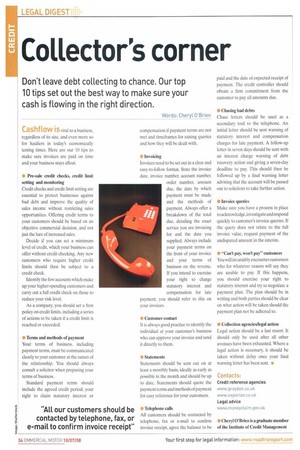Collector's corner
Page 34

If you've noticed an error in this article please click here to report it so we can fix it.
Don't leave debt collecting to chance. Our top 10 tips set out the best way to make sure your cash is flowing in the right direction.
Words: Cheryl O'Brien
Cashf tow
i.... vital to a business, regardless of its size, and even more so for hauliers in today's economically testing times. Here are our 10 tips to make sure invoices are paid on time and your business stays afloat.
• Pre-sale credit checks, credit limit setting and monitoring Credit checks and credit limit setting are essential to protect businesses against bad debt and improve the quality of sales income without restricting sales opportunities. Offering credit terms to your customers should be based on an objective commercial decision, and not just the lure of increased sales.
Decide if you can set a minimum level of credit, which your business can offer without credit checking. Any new customers who require higher credit limits should then be subject to a credit check.
Identify the few accounts which make up your higher-spending customers and carry out a full credit check on those to reduce your risk level.
As a company, you should set a firm policy on credit limits, including a series of actions to be taken if a credit limit is reached or exceeded.
• Terms and methods of payment Your terms of business, including payment terms, must be communicated clearly to your customer at the outset of the relationship. You should always consult a solicitor when preparing your terms of business.
Standard payment terms should include the agreed credit period; your right to claim statutory interest or compensation if payment terms are not met and timeframes for raising queries and how they will be dealt with.
• Invoicing Invoices need to be set out in a clear and easy-to-follow format. State the invoice date, invoice number, account number, order number, amount due, the date by which payment must be made and the methods of payment. Always offer a breakdown of the total due, detailing the exact service you are invoicing for and the date you supplied. Always include your payment terms on the front of your invoice and your terms of business on the reverse. If you intend to exercise your right to charge statutory interest and compensation for late payment, you should refer to this on your invoices.
• Customer contact It is always good practice to identify the individual at your customer's business who can approve your invoice and send it directly to them.
• Statements Statements should be sent out on at least a monthly basis, ideally as early as possible in the month and should be up to date. Statements should quote the payment terms and methods of payment for easy reference for your customers.
0 Telephone calls All customers should be contacted by telephone, fax or e-mail to confirm invoice receipt, agree the balance to be paid and the date of expected receipt of payment. The credit controller should obtain a firm commitment from the customer to pay all amounts due.
• Chasing bad debts Chase letters should be used as a secondary tool to the telephone. An initial letter should be sent warning of statutory interest and compensation charges for late payment. A follow-up letter in seven days should be sent with an interest charge warning of debt recovery action and giving a seven-day deadline to pay. This should then be followed up by a final warning letter advising that the account will be passed out to solicitors to take further action.
• Invoice queries Make sure you have a process in place to acknowledge, investigate and respond quickly to customer's invoice queries. If the query does not relate to the full invoice value, request payment of the undisputed amount in the interim.
• "Can't pay, won't pay" customers You will invariably encounter customers who for whatever reason will say they are unable to pay. If this happens, you should exercise your right to statutory interest and try to negotiate a payment plan. The plan should be in writing and both parties should be clear on what action will be taken should the payment plan not be adhered to.
• Collection agencies/legal action Legal action should be a last resort. It should only be used after all other avenues have been exhausted. Where a legal action is necessary, it should be taken without delay once your final warning letter has been sent. is Contacts:
Credit reference agencies www.graydon.co.uk www.experian.muk Legal advice www.moneyclaim.gov,uk
• Cheryl O'Brien is a graduate member of the Institute of Credit Management








































































































































































